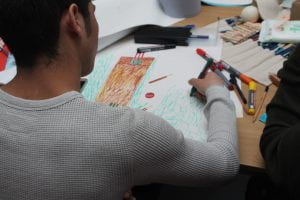By Natasha Carver
‘Esther, can you see Amir. He’s been refused Section 95 support …’
‘Samira, I need you to do an urgent HC1 for this chap with kidney failure …’
‘Mariana, we’ve got a young boy off a lorry just turned up. He has nothing. He’s with Muna in the main hall just now getting a cup of tea and some warm clothes …’
Harriet, the Caseworker Coordinator, is allocating appointments. If the work sounds complicated, it is: Section 95, Schedule 10, Section 4, Pre-Action Protocol, HC1. Anyone could be forgiven for thinking that Harriet’s team were hot-shot lawyers, well-remunerated for their extensive knowledge and experience. But this is Bristol Refugee Rights (BRR), and Harriet’s team are all volunteers.

Some years ago, when I worked in the sector, there were specialist providers who received statutory funding to help asylum-seekers – who are not permitted to work – to apply for financial support and accommodation. But government policy put an end to that funding and now, in Bristol at least, those seeking access to the little to which they are entitled come in despair to the advice team at BRR. I’m an academic now and a trustee of BRR, and I’ve come to find out about the everyday impact of the Hostile Environment on its intended targets.
When she was Home Secretary, Theresa May enacted a policy aimed at creating an environment ‘so hostile’, that those seeking safety and security in the UK would abandon their quest, give up fighting for their rights and entitlements, and leave the country. This policy has not been successful: the number of those removed voluntarily and by force from the UK has fallen year by year, while recent research estimates that for every ‘authorised’ migrant in the UK, there is another ‘unauthorised’ one.
But the policy has caused untold harm to many. The national media has reported on some of the casualties. The plight, for example, of the highly-skilled, recruited with the hope that they would make the UK their home and then subsequently refused leave to remain after many years on the spurious basis of tax return discrepancies. The abrupt curtailment of the visas of tens of thousands of students following evidence that an unspecified number had cheated at an English test. And the terrible injustices and hardships suffered by many of the (often British) children of the Windrush generation.
These groups of ‘authorised’ migrants and/or their children are portrayed as being the innocent victims of the Hostile Environment Policy; collateral damage caused by confusing unlawful with undocumented. But what about the toll of this policy on its intended targets – asylum-seekers, failed asylum-seekers and the ‘unauthorised’? And what about the damage to British justice and reputation? Can we really still claim to be a welcoming society?
Once Harriet has finished allocations, she asks the team if there are any issues that need to be discussed. Esther relates that she gave up after spending two and a half hours waiting in a telephone queue last week on a routine call to Migrant Help, the charity awarded the Home Office contract as the ‘point of call’ for migrants who have questions about their applications or need to inform the Home Office about a change in circumstances. I’m aghast. Two and a half hours! But Esther is not complaining about the length of the wait. Kafkaesque-style government bureaucracy has become so normalised for this team that waiting – the very condition of being an asylum-seeker – is no longer noticeable as an outrage. She is complaining instead about Migrant Help’s recent decision to remove the indication regarding the position you are in the queue and therefore the potential length of the wait.
Later, Advice Team Manager Elinor explains to me that before the introduction of the Hostile Environment Policy, asylum-seekers and caseworkers could contact the Home Office directly about their applications for the basic support to which they are entitled: £37.75 per week and accommodation. The whole process of applying usually took a few weeks, and if further evidence was required, the Home Office would call and request it. Now, applications typically take twice as long, and then have to be chased and actively pursued by BRR volunteers. For a new claimant that usually means 6-8 weeks of living on the streets or sofa-surfing. Migrant Help is the only point of contact for everything support-related, including numerous housing problems such as broken boilers, rat infestations, major damp problems, no locks on the door. One BRR member spent six months with no running water.
‘They would be better called “Migrant Barrier”,’ says one volunteer. ‘They do not help.’
Volunteers recount experiences of waiting for hours, only to be cut off when they get through; of staff who seem to have little to no understanding about the process and who mis-advise. Complaints about the atrocious service fall on deaf ears: this is after all one aspect of how an environment is made hostile. Meanwhile the process of claiming financial support has become more complex and more bureaucratic. The volunteers give me examples where the Home Office has sent out a request for a different document week after week, or even the same document, repeatedly causing delay to applications. Or worse, refusing applications outright over failure to tick a box, meaning that they need to be appealed which takes more time.
I ask them to describe the system to me:
‘So far from justice.’
‘Insanely complicated.’
‘Chaotic but also cruel.’
‘Hostile. Deliberately hostile.’

These are applications made not just for the welfare of the migrant who will be destitute without this basic entitlement, but also for the welfare of our communities and the streets where we live. Street homelessness takes a terrible toll on the mental and physical health of the individual involved, but it also has a financial and social toll on all of us.
After the meeting I am given the opportunity to observe Esther as she talks with Amir, the BRR member who has been refused ‘Section 95’. He had applied for just the financial element because he was staying with a local family. They themselves were on a very low income and struggled to feed an extra person. The decision to refuse Amir has led the family to decide that they can no longer offer him accommodation. They have written a letter explaining their circumstances: feeding Amir on their very tight budget means they have had to scrimp on heating and clothing. They add that Amir often wakes up screaming, which disturbs them and their children.
Amir must now apply for both the financial element and accommodation. He has nowhere else to go. He is softly spoken, apologetic and deeply sad. He tells Esther that he has not seen his own family for ten years. Esther takes him through the application patiently and slowly. She says everything of importance at least three times. She tells him right at the outset that he is unlikely to be housed in Bristol. He tells Esther that he has friends here and a support network, and his mental health is bad and it would be too difficult to move somewhere else. Esther explains that she understands all this but if he applies for accommodation, he will be housed somewhere else, possibly far, far away.
While the asylum support system has justifiably been described as ‘disabling’, Esther is consistently enabling. She and fellow advice volunteers are just one part of BRR’s aptly named ‘Welcome Team’, a 30-strong group of volunteers who do all they can to provide hospitality and warmth to counter the overt government hostility.
‘Sometimes there’s not much we can practically do,’ explains Mariana, ‘but just listening to the person and treating them like a fellow human being goes such a long way.’
By the time I leave, the line of silent, crushed and despairing faces that waited outside the hall on my arrival has gone. In its place, the hall reverberates with the noise of chatter, games, crafts, cooking and laughter.
If you would like to help Amir and others affected by the Hostile Environment Policy any money you donate to Bristol Refugee Rights between 3rd and 10th December will be doubled as part of #ChristmasChallenge19 as part of The Big Give: https://www.bristolrefugeerights.org/news-and-events/urgent-appeal/.
Note: The names of the BRR volunteers and members have been changed in order to protect identities.
Natasha Carver is a Research Associate at Cardiff School of Law and Politics. She is currently researching criminal prosecutions involving migrants.


well written. Thank you for highlighting these crucial failings in the system and the work BRR volunteers do to ease the trauma faced by asylum seekers. Just asking you to do all possible to publish this on other platforms …it deserves t be read by all.